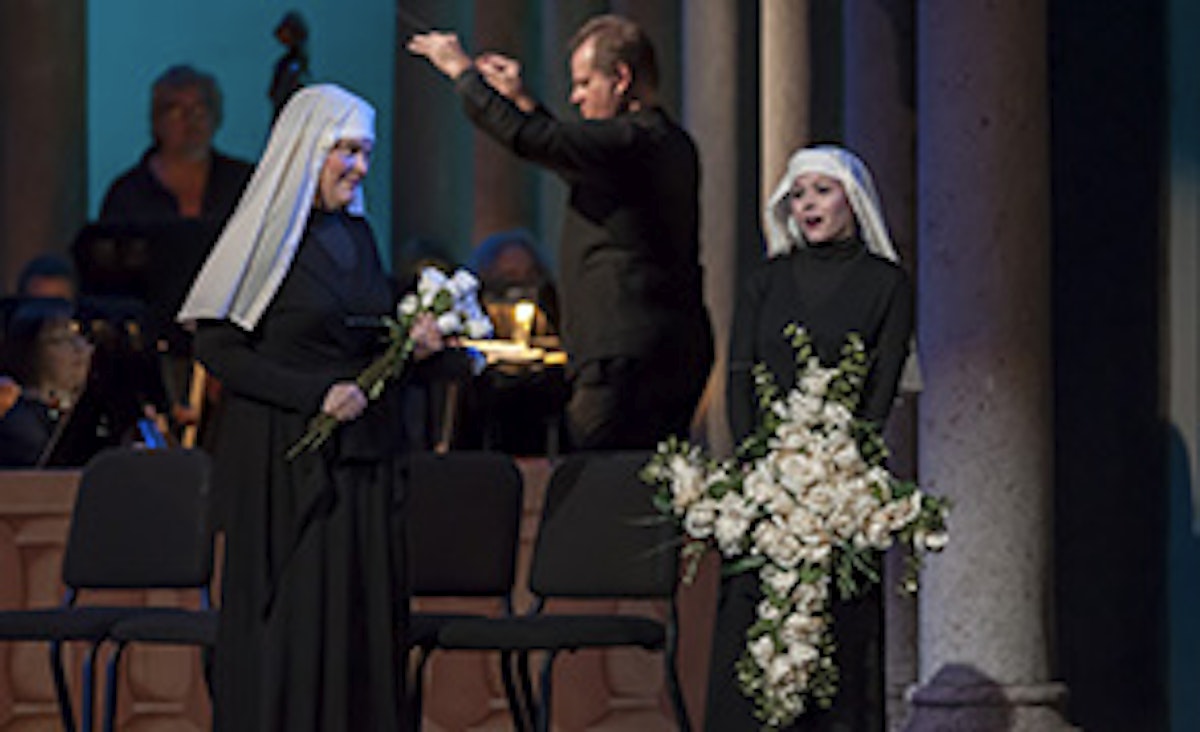Review: ‘Dialogues of the Carmelites,’ Under Will Crutchfield, Finds Beauty Anew
By Roslyn WertheimerOriginally Published by The New York TimesBy Anthony Tommasini
KATONAH, N.Y. — The conductor Will Crutchfield’s Bel Canto at Caramoor program has been bringing eager audiences to this festival here in Westchester County each summer for performances of operas from the early 19th century. On Saturday at Caramoor’s Venetian Theater Mr. Crutchfield turned to a work that couldn’t seem further from the era and style of bel canto: Poulenc’s “Dialogues of the Carmelites,” performed in the original French. First presented in 1957, this austerely beautiful and wrenching opera, loosely based on a historical event — the guillotining of 16 nuns from the Carmelite convent of Compiègne during the French Revolution — owes more to Debussy and Neo-Classical Stravinsky than the bel canto composers of an earlier time.
It makes sense for Mr. Crutchfield to vary the offerings now and then. Beyond that, in a perceptive program note, he suggests ties between Poulenc’s approach to opera and the practices of a period when opera composers made melody primary and cultivated styles of beautiful singing (bel canto). Mr. Crutchfield put his thoughts into practice through the spacious, detailed performance he drew from an impressive cast and the Orchestra of St. Luke’s.

In his note, he writes that for all its French refinement, Poulenc’s score “needs, and rewards, the beauty of tone and expression that the greatest operatic voices cultivate.” The Metropolitan Opera’s first production of “Dialogues, in 1977, one of the great achievements of the director John Dexter, included Régine Crespin, Shirley Verrett, Mignon Dunn and the young Maria Ewing in its stellar cast.
Mr. Crutchfield assembled a cast of strong singers for this “Dialogues.” Though a true ensemble piece, the opera focuses on Blanche de la Force, a young woman treated like an adored child by her good father, the Marquis de la Force, and protective brother, the Chevalier. After her carriage is attacked by mobs burning with revolutionary fervor, Blanche tells her father she has resolved to enter a convent. As she learns, one does not take orders to escape the outside world, especially at this tumultuous time in France, where the church is seen as in league with the hated aristocracy. “Dialogues” tells the story of Blanche’s journey to overcome fear, or, as her brother puts it perceptively, her “fear of fear.”
As Blanche, the soprano Jennifer Check gave a beautifully sung and impassioned performance. When Blanche gives in to her panic, Ms. Check daringly summoned chilling intensity. The role of Madame de Croissy, the prioress of the convent, has often been the province of artists in later stages of their careers. On this night the soprano Deborah Polaski, 66, who has been a leading Wagnerian soprano, gave an overwhelming performance as the fatally ill prioress, singing with penetrating sound and dark colorings. She was shattering during the prioress’s death scene, when this lifelong nun flails about with fear and fury and cries out that God has abandoned her.
The veteran soprano Hei-Kyung Hong made a vocally mature and dramatically affecting Madame Lidoine, who arrives as the new prioress. The vibrant mezzo-soprano Jennifer Larmore brought unusual feistiness to Mother Marie, who cannot hide a bit of resentment over always being a subprioress. Daniel Mobbs as the marquis, Noah Baetge as the chevalier and Scott Brunscheen as the chaplain were also effective. My favorite role in this opera, young Sister Constance, the eternal optimist, a chatterbox, was beautifully taken here by the sweet-voiced, endearing soprano Alisa Jordheim.
The director Victoria Crutchfield, Mr. Crutchfield’s daughter, drew nuanced performances from the cast and used the limited staging space of the open-air theater inventively. With just a few chairs and such as props and simple costumes, this “Dialogues” was production enough for the audience, which cheered everyone.